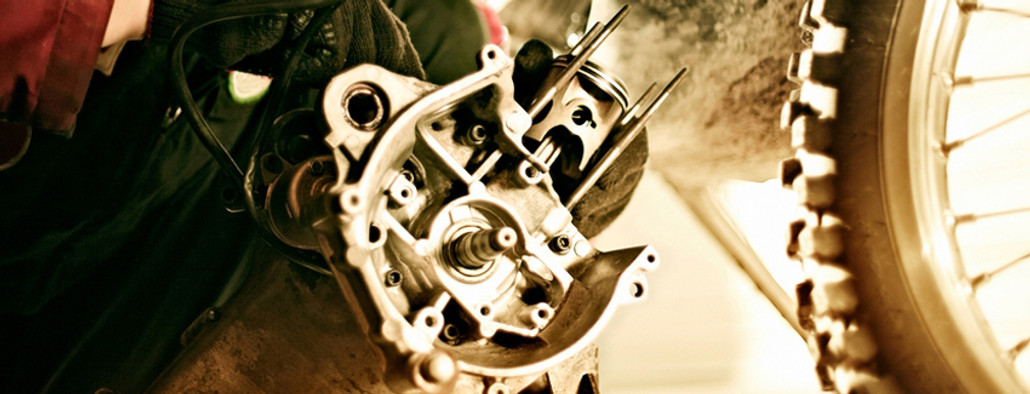Ethanol and Motorcycles
Posted by Ben Baker on Mar 13th 2017
| Finding 100 percent gasoline is hard and getting harder all the time. Efforts are afoot to turn the 10 percent ethanol blend into a 15 percent blend. |
| What is ethanol? Why is it used? Is it any good? Does it really harm engines? So what's the flap about ethanol? |
| Ethanol (CH3CH2OH) is not-aged alcohol. The only difference between ethanol and a shot of your favorite at the bar is filtering, aging and added flavors. That's it. The same corn that produces alcohol also produces moonshine. The factories that produce ethanol for addition into motor fuels are just giant stills. |
| There's a seriously big difference between some of Kentucky (or wherever's) finest and the stuff that is shipped out of an ethanol-for-fuel plant. Before the alcohol for the gas tank leaves the plant to be blended with gasoline, the plant adds a tad of gasoline to the mix. This means it is NOT safe to drink. |
| It gets to a blending station and it's turned into E-10, E-15, or E-whatever fuel. |
| WHY IS IT USED? |
| The Department of Energy has a some reasons. The chief reasons are, "Ethanol is a renewable, domestically produced alcohol fuel made from plant material, such as corn, sugar cane, or grasses. Using ethanol can reduce oil dependence and greenhouse gas (GHG) emissions." |
| Another kind of alcohol, Methanol (CH3OH) AKA "wood alcohol" is the fuel used in dragsters and other racer rides. Methanol is poisonous to human beings. |
| IS ETHANOL ANY GOOD? |
| When properly aged in an oak cask for years and served in a glass over an ice cube or two, ethanol is delightful (at least to me). |
| If you want power, ethanol falls short. "A gallon of gasoline provides one-third more energy than a gallon of ethanol," says Bell Performance. Less power translates directly into more gallons of fuel burned per mile driven. That's why the ethanol blends deliver less MPG. |
| If you are after "green" fuel, then ethanol is better. Ethanol is made from plants. Corn is the most common source, but it can be made from any plant. |
| DOES IT HARM ENGINES? |
| Short answer - Stored and used property in new motorcycles, no. Used in old bikes, could be. |
| Alcohol can damage some rubber parts in the fuel and engine system. Since it absorbs water, there's an issue of potential rust and fuel separation in the tank. |
| The Kentucky Corn Growers Association is a major ethanol promoter. They say no. The Association says, among other things, "An E10 blend cannot absorb enough moisture out of the air to cause phase separation." Phase separation means the gas separates from the alcohol. That's a BIG problem. |
| Bell Performance disagrees with the Kentucky Corn Growers. "Ethanol soaks up water from everything, including air. Once alcohol in gasoline has soaked up enough water, it causes phase separation and water contamination." |
| Both sides point to plenty of studies that back up their position. A study from the Environmental Protect Agency sides more with the non-ethanol crowd. "In the case of two-stroke engines, this water-ethanol phase will compete with the blended oil for bonding to the metal engine parts. Therefore, the engine will not have enough lubrication, and engine damage may result." And, "Therefore, ethanol/gasoline blends can dissolve much more water than conventional gasoline, whereas gasoline/MTBE blends act very much like conventional gasoline when in the presence of water." |
| All sides in the debate say you should not store gasoline for a long time without adding a stabilizer. If you have to burn e-blends and ride a lot, you should not worry. If you let your bike sit up for a while, drain and purge the tank and fuel lines. |
| So is ethanol bad for a motorcycle engine? It can be. See the EPA study above. Popular Mechanics takes an excellent look at that question. |
| Should you burn ethanol in your ride? Ask people who have outboard motors on boats about ethanol-blended gasoline. Talk to mechanics who work in the marinas. Talk to small motor mechanics, especially the wrench monkeys that work on classic bikes and old bikes. Make sure you take your bike when you talk to the mechanic. |

